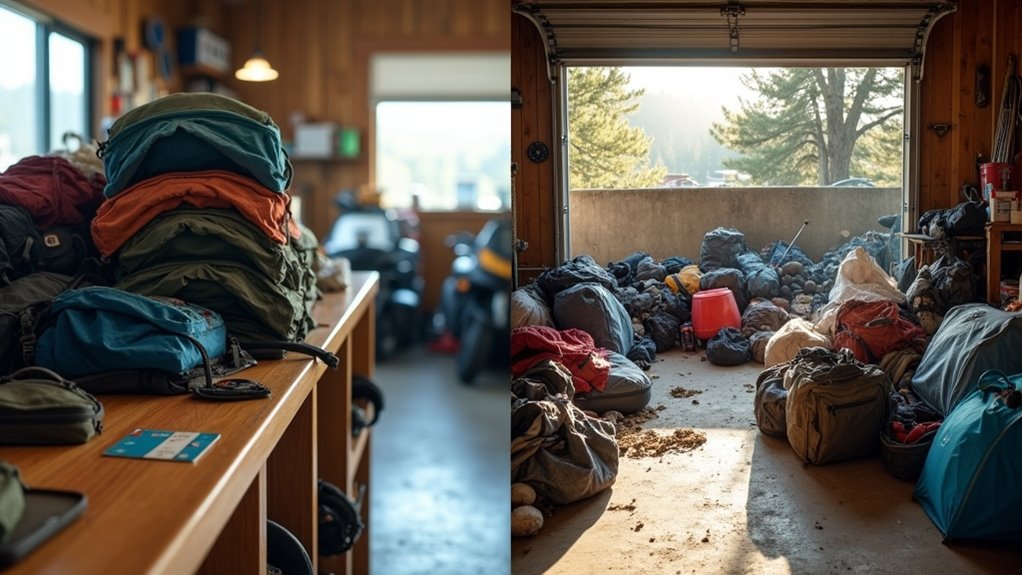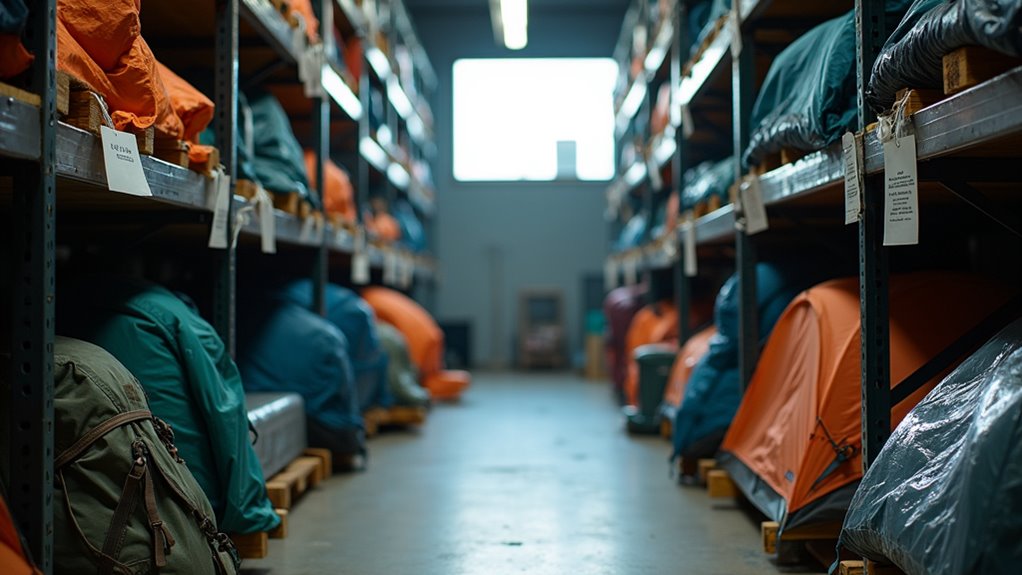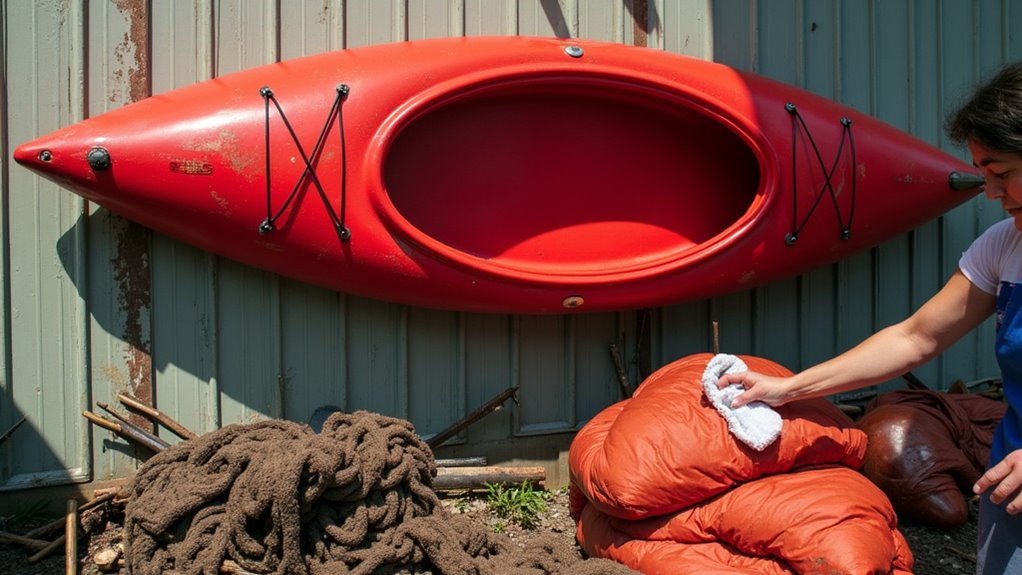Physical Address
304 North Cardinal St.
Dorchester Center, MA 02124
Physical Address
304 North Cardinal St.
Dorchester Center, MA 02124

Analyzing whether to rent or buy camping gear? Discover the hidden costs and benefits before your next outdoor adventure.
If you’re weighing the decision to rent or buy camping equipment, you may wish to evaluate more than just the price tag. While renting can save you money on occasional trips and eliminate storage headaches, it comes with its own set of challenges. From quality concerns to seasonal availability, your choice will impact both your outdoor experience and your wallet. Let’s examine the key factors that will help you make the smartest decision for your camping needs.

When deciding between renting and purchasing camping equipment, your frequency of use plays the most essential role in determining cost-effectiveness.
Smart camping gear decisions come down to one key factor: how often you’ll actually use the equipment.
If you’re an occasional camper, renting can save you money with daily rates between $25-$34 for a tent, compared to purchasing costs of $230-$460. You’ll also avoid maintenance expenses and storage concerns. New First Time Camper? Consider Renting The Camping Gear This can be a smart choice for new adventurers.
However, if you camp regularly, buying your gear becomes more economical over time. While you’ll face a larger upfront investment, you won’t have to worry about rental availability during peak seasons or recurring rental fees. Immediate availability for spontaneous trips is a key advantage of tent ownership.
Consider that rental costs can quickly add up with frequent use, potentially exceeding the purchase price. Plus, owning equipment gives you the flexibility to camp spontaneously and customize your gear to your specific needs.
Renting camping equipment offers significant storage advantages that can benefit both apartment dwellers and homeowners alike.
You’ll free up valuable square footage in your home or garage since you won’t need to store bulky tents, sleeping bags, or cooking gear year-round. This means you can use that space for everyday essentials instead. With average warehouse rental rates approaching $10 per square foot, avoiding the need for extra storage space can lead to substantial savings.
You won’t have to worry about maintaining a climate-controlled environment or protecting equipment from moisture, dust, or pests. The rental company handles all storage concerns, including proper maintenance and protection from the elements. Plus, renting camping gear can be more cost-effective than purchasing your own equipment, especially for occasional campers.
Plus, you’ll have the flexibility to swap out different sizes of equipment without needing extra storage space. When you’re done with your adventure, simply return the gear and enjoy your clutter-free living space until your next outdoor expedition.

Beyond the storage advantages, the environmental implications of camping equipment rentals deserve careful evaluation. When you rent gear, you’ll help reduce waste by preventing unnecessary purchases that often end up in landfills.
You’re also supporting resource conservation through the reuse of existing equipment rather than driving demand for new manufacturing. The increasing environmental consciousness among consumers has made rental options more appealing than ever before. Portable furniture can also be rented, further reducing the environmental impact of camping trips.
However, there are trade-offs to weigh. The frequent transportation of rental equipment between locations increases carbon emissions, and the cleaning process often involves chemical use that can affect water quality.
You’ll also find that rental gear requires regular maintenance and eventual replacement, which still impacts resource consumption.
To maximize environmental benefits, look for rental companies that use eco-friendly cleaning products, implement carbon offset programs, and maintain efficient logistics to minimize transportation emissions.
Quality camping gear stands at the forefront of any rental decision. You’ll find rental companies typically maintain high standards, with equipment undergoing regular inspections and professional cleaning between uses.
Tents often meet ISO 5912 standards for safety, rain resistance, and ventilation, while sleeping bags are sanitized after each rental. Equipment safety is enhanced through UL 8750 certification for LED camping lanterns. Many rental providers also offer essential camping gear to ensure you have everything needed for your adventure.
You’ll have access to various equipment sizes and styles to match your needs. Whether you’re camping solo or with a group, you can select appropriate tents, sleeping bags, cooking gear, and wildlife-proof coolers.
However, be aware that quality can vary between providers, and some gear may show signs of previous use despite maintenance. It’s smart to verify a rental company’s maintenance policies and inspect equipment thoroughly before committing to ascertain you’re getting reliable gear for your adventure.

When you rent camping equipment, you’ll need to understand your maintenance responsibilities to avoid unexpected charges and guarantee gear longevity.
You’re typically responsible for daily cleaning, basic inspections, and minor repairs like tightening loose components or replacing small parts. Regular checks and inspections help catch potential issues early, leading to extended equipment lifespan. Camping generators can provide essential benefits to your outdoor adventures, such as powering essential devices and lighting.
Daily maintenance, inspections, and basic repairs are part of your rental equipment duties – keep gear in top shape to avoid issues.
Store all gear in dry, elevated spaces using pallets or blocks to prevent moisture damage. For electronics, remove batteries to avoid corrosion, and use appropriate covers for weather protection.
Document every maintenance action with photos, timestamps, and detailed notes – this protects you from disputes.
If issues arise, report them immediately to the rental company through established channels.
While you’ll handle routine care and minor fixes, the rental company usually covers major mechanical failures. However, you’ll be liable for damage caused by negligence, so following maintenance guidelines is essential.
Renting camping equipment offers distinct advantages for accessibility and travel convenience, especially if you’re new to outdoor adventures or have limited storage space.
You’ll benefit from lower upfront costs and won’t need to worry about storing bulky gear at home. The flexibility to pick up equipment near your campsite eliminates transportation hassles and saves valuable cargo space. The market’s expansion to USD 31.93 billion by 2034 indicates growing availability of rental options worldwide. Essential RV camping tips can help you make the most of your rental experience.
However, you’ll need to plan carefully around rental service limitations. Availability can be scarce during peak seasons, and not all locations offer rental options.
While some services provide adaptive equipment for disabled campers, these offerings aren’t widespread. You’ll also need to work within the rental service’s operating hours and return policies.
Despite these constraints, renting remains a practical solution for occasional campers and those testing the waters of outdoor recreation.
Like a Swiss Army knife, camping equipment rental offers versatility for your outdoor adventures. You’ll save money if you’re an occasional camper, and you won’t need extra storage space at home. While you’ll need to plan ahead for availability and handle basic maintenance, renting can be your smart gateway to testing different gear. Consider your camping frequency, budget, and storage limitations to decide if renting’s right for you.